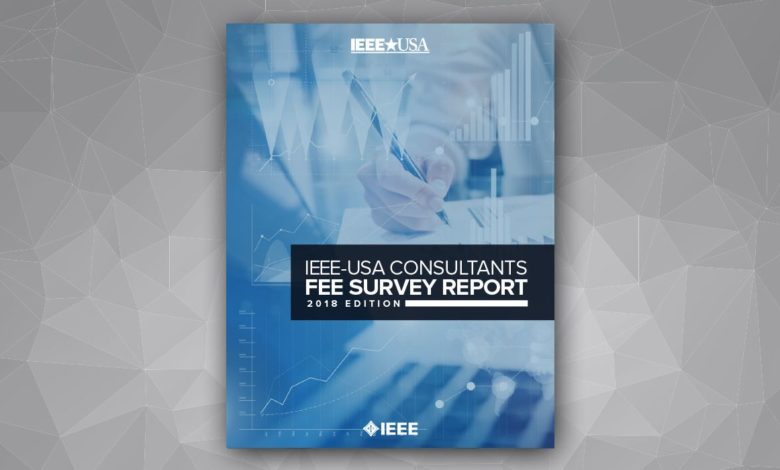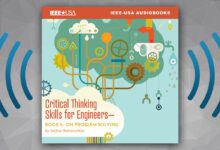
Greater numbers of engineers with substantial professional experience are becoming consultants. According to the 2018 IEEE-USA Consultants Fee Survey, the average (mean) age of consultants has risen to 61 years—from 55 in the 2017 report. Moreover, consultants’ years of working experience increased significantly this year—to 28, up from 22 last year.
Does this mean that highly experienced, older engineers are turning to consulting because they lost their previous employment; or are there other, less obvious reasons for this year’s survey results? That’s about the only question the report doesn’t answer.
The survey, which was conducted this past spring, shows that, as with the IEEE membership in general, the vast majority of consultants are male (95%). In addition, men have more years in consulting than women, with females averaging about 18.6 years—nearly a decade less in comparison to men.
Nearly nine in ten (89%) of the consultants participating in this year’s survey identify as non-Hispanic White. The largest minority group among consultants is Asian or Pacific Islander, with 3.8%, which slipped from 5.2% last year. Only 1.6% classify themselves as Hispanic, down from 4.2% last year; further, only 1.6% identify as African American (not Hispanic origin). Another 4.2% categorize themselves as an ethnicity not listed in the survey question.
Nearly 90% (87.1%) of respondents are United States citizens by birth. Another 9.4% are naturalized citizens; while 2.2% are permanent resident aliens, consistent with 2017.
The median hourly rate charged this year by consultants is $150, reflecting a decrease of $10 (-6%) over last year’s report. However, the median hourly rate remains relatively stable with the number of years of professional experience. The typical consultant who has been in the profession for less than 15 years reports an hourly rate of $169. Those with 25-34 years of experience report $196–the highest median hourly rate. Those with 35 or more years of experience report a rate of $181.
Education level is a significant factor in how much consultants charge. The 23% with a Ph.D. have a $58 an hour advantage in their median hourly rate—at $212. This increase represents a $25-34 median advantage an hour over those with a Master’s degree. Notably, there is virtually no difference in hourly rates between those with a Bachelor’s degree, and those with a Master’s degree.
Nearly a quarter (23%) of consultants hold a Ph.D. For nearly four in ten (39%) consultants, their highest degrees are Master’s, the largest portion being those with MSEE/MSCE degrees. About one-third (36%) have a Bachelor’s, with about a third of that group holding either a BSEE or a BSCE.
Although professional registration is required to practice as an engineer in many other countries, it is not essential for most EEs in the United States. In this year’s survey, 31.2% are registered professional engineers (PEs). However, those with a Professional Engineer’s license enjoyed a $22 hourly advantage over those without. The last time the difference was this large was in 2014, when the 2013 data showed a $21 an hour advantage for those with a PE license. In addition, this advantage is an increase from a $12 difference in the hourly rate reported in 2017.
To understand their areas of expertise, consultants were asked to select all the technical specialties, of 93 listed, in which they offer consulting services. About a quarter or more consultants mention each of the top five: Systems Engineering (38.9%), Project Management (30.2%), Expert Witness (27.8%), Electrical Power Systems (27.6%) and Communications (24.1%).
The five areas with the greatest increases from 2015 to 2018 are: Analog Design (+9%), C## (+7.5%), RF Systems (+6.5%), Expert Witness (+6.2%), and Simulation and Modeling (+6.2%). The five areas with the greatest losses during that three-year period are: Test Engineering, Equipment or Services (-3%), Networks— LAN/WAN—Other (-3.3%), Databases and Data Management (-3.6%), Software Development, Application and Management (-3.9%), and C++ (-7.8%).
As with the last two survey reports, the work setting for almost 70% (69.8%) of respondents is their home office. Almost half (49.9%) carry professional liability insurance, in case of errors or omissions. The average consultant bills a mean of 25 hours a week, compared with 29 hours in last year’s report. Repeat client business—60.5%—accounts for a substantial portion of consultants’ earnings; but having outside connections is also important. Significant earnings come from referrals from clients and friends (15%) and contacts made by networking (11%).
The majority of consultants (63.2%) work with private, non-defense companies. When defense-related firms are added in, the private industry share rises to nearly three-fourths of all respondents. Among other sectors, only utilities came closest, at 11.4%.
When examining which parts of the United States offer the highest rates of compensation, the Pacific region (California, Oregon and Washington) has the highest average hourly rate—$230, compared to $168 last year. When going by the location of the largest number of their clients within the United States, those whose clients are primarily in the Pacific or Middle Atlantic (New York, Pennsylvania, New Jersey) have the highest averages, at $203 or $172, respectively. The IEEE-USA Consultants Fee Survey analyzes responses using United States Census Bureau Regions, not IEEE Region designations.
IEEE-USA has conducted surveys about the compensation and fringe benefits of IEEE’s U.S. members since 1972. For nine of the last 10 years, separate information has been gathered about consultants’ compensation. This past spring, 11,286 members identified as consultants in the IEEE membership database were invited by email to complete the 2018 IEEE-USA Consultants Fee Survey. Of this number, 635 respondents participated in the survey. All findings in this report represent only those identified as self-employed consultants, defined as the 457 individuals who indicated that at least half of their consulting hours came from working independently, with partners or incorporated. IEEE Strategic Research conducted the survey, and prepared the report based on the 457 responses.
Helen Horwitz is an award-winning freelance writer who lives in Albuquerque, N.M. She was with IEEE from 1991 through 2011, the first nine as staff director, IEEE Corporate Communications.






